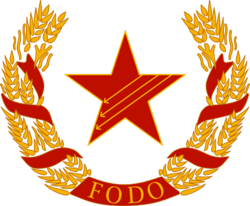Authoritarian Working People's Front: Difference between revisions
No edit summary |
No edit summary |
||
| Line 104: | Line 104: | ||
}} | }} | ||
The '''Authoritarian Working People's Front''' ({{wp|Walloon language|Autuzian}}: ''Fiesse otoritaire des djins ovraedjes'', ''FODO'', colloquially ''Otoritaires'') was the {{wp|one-party state|sole}} {{wp|governing party}} of the autocratic revolutionary [[Auzance|Council Republic of Auzance]] in the decade and a half after the dissolution of the Provisional Government in 1934. Led by [[Remy Warnot]] virtually throughout its entire existence, the Otoritaires transitioned Auzance slowly from a semi-democratic council republic to a totalitarian state socialist country, while their ''defunctionalisation'' programme - initially aimed at those "compliant" to the [[National Functionalism|national functionalist]] regime - was expanded to legitimise the persecution of Gaullican speakers, religious people, other non-adherents to Otoritaire politics (particularly liberals, social democrats and conservatives, deemed by the Front to be ''social functionalists''), and those deemed to have stepped outside of the ''"Autuzian ideal"'' - including homosexuals, those seeking abortions and misogynists. Initially councilist, the Otoritaires gradually moved towards centralising powers at the expense of ideology, and adopted an approach more closely resemblant of state socialism. | The '''Authoritarian Working People's Front''' ({{wp|Walloon language|Autuzian}}: ''Fiesse otoritaire des djins ovraedjes'', ''FODO'', colloquially ''Otoritaires'') was the {{wp|one-party state|sole}} {{wp|governing party}} of the autocratic revolutionary [[Auzance|Council Republic of Auzance]] in the decade and a half after the dissolution of the Provisional Government in 1934. Led by [[Remy Warnot]] virtually throughout its entire existence, the Otoritaires transitioned Auzance slowly from a semi-democratic council republic to a totalitarian state socialist country, while their ''defunctionalisation'' programme - initially aimed at those "compliant" to the [[National Functionalism|national functionalist]] regime - was expanded to legitimise the persecution of Gaullican speakers, religious people, other non-adherents to Otoritaire politics (particularly liberals, social democrats and conservatives, deemed by the Front to be ''social functionalists''), and those deemed to have stepped outside of the ''"Autuzian ideal"'' - including homosexuals, those seeking abortions and misogynists. Initially councilist, the Otoritaires gradually moved towards centralising powers at the expense of ideology, and adopted an approach more closely resemblant of state socialism. | ||
{{Template:Auzance topics}} | |||
[[Category:Auzance]] | |||
Latest revision as of 11:47, 6 December 2023
This article is incomplete because it is pending further input from participants, or it is a work-in-progress by one author. Please comment on this article's talk page to share your input, comments and questions. Note: To contribute to this article, you may need to seek help from the author(s) of this page. |
Authoritarian Working People's Front Fiesse otoritaire des djins ovraedjes | |
|---|---|
 | |
| Abbreviation | FODO |
| Leader | Remy Warnot |
| Founded | May 24, 1934 |
| Dissolved | March 31, 1948 |
| Succeeded by | Workers' National Party of Auzance |
| Headquarters | Cestiène |
| Newspaper | Li Nåcional |
| Youth wing | Auzance Working Youth |
| Women's wing | Women Autuzians |
| Membership (1948) | |
| Ideology | Communism Authoritarianism |
| Political position | Far-left |
| Colors | Red |
| Slogan | "We will endure if we hold fast, together" |
The Authoritarian Working People's Front (Autuzian: Fiesse otoritaire des djins ovraedjes, FODO, colloquially Otoritaires) was the sole governing party of the autocratic revolutionary Council Republic of Auzance in the decade and a half after the dissolution of the Provisional Government in 1934. Led by Remy Warnot virtually throughout its entire existence, the Otoritaires transitioned Auzance slowly from a semi-democratic council republic to a totalitarian state socialist country, while their defunctionalisation programme - initially aimed at those "compliant" to the national functionalist regime - was expanded to legitimise the persecution of Gaullican speakers, religious people, other non-adherents to Otoritaire politics (particularly liberals, social democrats and conservatives, deemed by the Front to be social functionalists), and those deemed to have stepped outside of the "Autuzian ideal" - including homosexuals, those seeking abortions and misogynists. Initially councilist, the Otoritaires gradually moved towards centralising powers at the expense of ideology, and adopted an approach more closely resemblant of state socialism.
